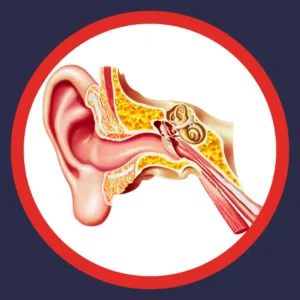Understanding hearing impairment begins by knowing how your ears function. Your ears have three main sections: outer, middle, and inner ear. Sound travels through the outer ear, causing the eardrum to vibrate. These vibrations pass through tiny bones in the middle ear, reaching the cochlea in the inner ear. Tiny hair cells in the cochlea convert these vibrations into electrical signals, which the auditory nerve sends to your brain as recognizable sound.

Several factors can disrupt this delicate process. Here, we’ll explore 11 common causes of hearing impairment and how to recognize and manage them.
1. Age-Related Hearing Loss (Presbycusis)
Age-related hearing loss is the most common cause of hearing impairment. As you age, the hair cells within your cochlea deteriorate. This gradual loss can make speech sound muffled, especially higher frequencies, making conversation challenging in noisy environments. Presbycusis typically affects adults over 65, but early signs can begin as soon as the mid-40s. Common complaints include difficulty hearing consonants clearly and often needing to turn up TV or radio volume significantly.
2. Exposure to Loud Noise
Loud noises can significantly damage inner ear structures. Exposure to sounds above 85 decibels, such as concerts, construction machinery, firearms, lawn equipment, power tools, or even prolonged headphone use, can result in permanent hearing loss. Repeated exposure compounds damage, gradually affecting the ability to hear high-pitched sounds first. Noise-induced hearing impairment is preventable using hearing protection like earplugs or earmuffs during noisy activities.
3. Genetic Factors
Genetic predisposition plays a crucial role in hearing impairment. Some individuals inherit genes making their ears vulnerable to damage from noise or aging. Genetic hearing loss can appear early in life or worsen progressively, affecting hearing in one or both ears. Syndromes like Usher syndrome or Waardenburg syndrome include hearing impairment among other symptoms. Genetic counseling and early screening help manage these risks effectively.
4. Earwax Buildup
Excessive earwax, medically known as cerumen impaction, can block sound transmission through your ear canal, causing temporary conductive hearing loss. Symptoms include muffled hearing, ear discomfort, ringing (tinnitus), or dizziness. Attempting to remove earwax improperly can worsen blockage or damage the eardrum, making professional earwax removal essential for safe and effective restoration of hearing.
Understand more about ear wax removal.
5. Infections and Illnesses
Several infections and illnesses can harm your hearing. Meningitis, measles, mumps, influenza, and chronic ear infections in childhood (otitis media) are significant contributors. High fevers associated with these illnesses can damage cochlear structures or auditory nerves permanently. Prompt medical treatment and preventive vaccinations can mitigate the risk of hearing impairment.
6. Ototoxic Medications
Certain medications have side effects that can damage hearing, known as ototoxicity. Aminoglycoside antibiotics (like gentamicin), chemotherapy drugs (such as cisplatin), loop diuretics (like furosemide), and high doses of aspirin can harm cochlear hair cells. Hearing impairment can develop rapidly or progressively, depending on dosage and individual sensitivity. Regular hearing checks during treatment and open communication with your healthcare provider can help manage risks.
Find out more about common medications that can cause hearing loss.
7. Physical Injury and Trauma
Trauma or physical injury to the head or ears can lead to hearing loss. Injuries such as skull fractures, concussions, or direct blows to the ear area may rupture the eardrum, disrupt middle ear bones, or affect auditory nerves. Barotrauma from sudden pressure changes, such as diving or flying, can also damage hearing structures. Immediate medical care following a head injury greatly improves the chances of minimizing long-term hearing damage.
8. Tumors and Abnormal Bone Growth
Conditions like otosclerosis, characterized by abnormal bone growth around the tiny bones in the middle ear, restrict their movement, causing conductive hearing loss. Acoustic neuromas, benign tumors on the auditory nerve, can cause gradual but significant hearing impairment, tinnitus, and balance problems. Treatment may involve surgical removal, radiation therapy, or observation, depending on the tumor’s size and growth rate.
9. Ménière’s Disease
Ménière’s disease affects the inner ear, causing fluctuating hearing loss, severe vertigo episodes, tinnitus, and a feeling of fullness in the ear. Typically impacting adults between 30 and 50, its exact cause remains unknown, though fluid buildup and pressure in the inner ear play roles. Dietary changes, medications, and vestibular therapy help manage symptoms and reduce the frequency of debilitating episodes.
Understand more about Meniere’s Disease.
10. Autoimmune Inner Ear Disease (AIED)
AIED occurs when your immune system mistakenly targets inner ear cells. This condition causes rapid bilateral hearing loss, tinnitus, dizziness, and balance issues. The hearing loss can progress quickly within weeks or months. Prompt medical intervention, usually involving steroids or immunosuppressive therapies, can help preserve remaining hearing. Early diagnosis and treatment are critical for favorable outcomes.
11. Congenital Hearing Loss
Congenital hearing impairment is present at birth and may result from genetic factors, prenatal infections like rubella or cytomegalovirus, or birth complications such as prematurity, low birth weight, or lack of oxygen during birth (birth asphyxia). Early diagnosis through newborn hearing screening allows immediate intervention, crucial for normal speech and language development.

Types of Hearing Loss Explained
- Sensorineural Hearing Loss: Caused by damage to the cochlea or auditory nerve, typically permanent but manageable with hearing aids.
- Conductive Hearing Loss: Results from blockage or damage in the outer or middle ear, often medically or surgically treatable.
- Mixed Hearing Loss: A combination of both conductive and sensorineural components, requiring comprehensive treatment approaches.
Get answers to frequently answered questions about hearing loss.
Signs You Might Have Hearing Impairment
It’s important to recognize symptoms early. Common signs include:
- Frequently asking people to repeat themselves
- Thinking others mumble or speak unclearly
- Turning the TV volume higher than others prefer
- Struggling to follow conversations in noise
- Avoiding social situations
- Trouble hearing phone calls
- Hearing ringing or buzzing (tinnitus)
- Loved ones pointing out your hearing changes
These signs often appear slowly. Testing can confirm the cause and guide treatment.
Why People Ignore Hearing Loss
Many people delay treatment even when reporting many symptoms. .
- They don’t recognize it. Others “just mumble,” they insist.
- They compensate. Turning up the volume feels easier than seeking help.
- They downplay it. Hearing loss is dismissed as “no big deal.”
- They fear hassle. Today’s hearing aids are easy to use and highly effective.
Don’t wait until it worsens. Early treatment makes a difference.
Understand the increase in hearing loss in millennials and Gen Z.
Diagnosis and Next Steps
A hearing care provider will use several tests to confirm the type and degree of hearing impairment:
- Audiometry: Measures how soft or loud sounds must be to hear them
- Bone conduction testing: Determines if hearing loss is sensorineural or conductive
- Word recognition testing: Measures how well you understand speech
- Tympanometry and acoustic reflex: Examines eardrum movement and response
- Otoacoustic emissions (OAE): Checks cochlear function
- Auditory brainstem response (ABR): Assesses how the brain processes sound
These tests help create the right plan for better hearing.
Find out all about hearing tests.

Protect Your Hearing at Every Age
Hearing health affects your communication, relationships, and quality of life. Whether you’re young or aging, protect your ears from loud noise and harmful medications. Address infections early, and don’t ignore early signs of hearing impairment. Choose foods that support nerve and cochlear health. If you notice changes, schedule a hearing test right away.
Let American Hearing + Audiology Help You Hear Better
We understand how frustrating hearing impairment can be. Our trusted hearing care providers offer personalized hearing evaluations and care. We help you understand your options—whether it’s hearing aids or other solutions. Your hearing matters, and we’re here to help every step of the way.
Take the first step today. Contact American Hearing + Audiology to schedule your hearing evaluation.



